
 ocqueville
ocqueville
 ocqueville
ocqueville
THE ARISTOCRATIC SOURCES OF LIBERTY
Lucien Jaume
Translated by Arthur Goldhammer
PRINCETON UNIVERSITY PRESS
Princeton & Oxford
World copyright 2008 by Librairie Arthme Fayard
English translation copyright 2013 by Princeton University Press
Published by Princeton University Press, 41 William Street, Princeton, New Jersey 08540
In the United Kingdom: Princeton University Press, 6 Oxford Street, Woodstock, Oxfordshire OX20 1TW
press.princeton.edu
Jacket Art: Thodore Chassriau (181956), Alexis de Tocqueville, 1850, Oil on canvas, 163.0 130 cm. Photo: Arnaudet. Chateaux de Versailles et de Trianon, Versailles, France. Photo credit: Reunion des Muses Nationaux / Art Resource, NY.
All Rights Reserved
Library of Congress Cataloging-in-Publication Data
Jaume, Lucien.
[Tocqueville. English]
Tocqueville : the aristocratic sources of liberty / Lucien Jaume ; translated by Arthur Goldhammer.
p. cm.
Translation of: Tocqueville : les sources aristocratiques de la libert biographie intellectuelle. Paris : Fayard, c2008.
Includes bibliographical references and index.
ISBN 978-0-691-15204-2 (acid-free paper) 1. Tocqueville, Alexis de, 18051859. 2. HistoriansFranceBiography. 3. DemocracyPhilosophy. 4. Political scienceFranceHistory19th century. I. Goldhammer, Arthur. II. Title.
DC36.98.T63J3813 2008
320.092dc23 2012032469
British Library Cataloging-in-Publication Data is available
Ouvrage publi avec le soutien du Centre national du livre ministre franais charg de la culture.
This work is published with support from the French Ministry of Culture / Centre national du livre.
This translation is published with the support of Sciences Po, Paris.
This book has been composed in Garamond Premier Pro
Printed on acid-free paper.
Printed in the United States of America
10 9 8 7 6 5 4 3 2 1
For Franoise Mlonio, who believed in this book long before it became a reality.
Opposite him was a young man with a pale face and somewhat sickly appearance. In his manners there was a grace and politeness that the present generation in France seems to value less than the previous generation. Who is that young man? I asked the person I was with, because he had made an impression on me. That is Monsieur de Tocqueville, came the answer. He has just published a quite remarkable book about democracy in the United States. That book has enjoyed an unusual fate: all the parties like it. The liberals and Carlists approve of it, and the juste-milieu spares it from attack. He is sought after and admired: all the salons want him. He is descended from an old family yet animated by a strong love of liberty. He belongs to the nobility by birth, to liberty by the activity of his mind.
Tocqueville in the salon of Madame Rcamier,
by douard Gans, 1836
Contents
 ocqueville
ocqueville
Introduction
There is, in many respects, a Tocqueville enigma.
Why did Tocqueville write Democracy in America? The question might seem incongruous.
The careful reader will therefore ask herself another question: But what did Tocqueville think about what he was describing? Tocqueville was usually at pains to conceal precisely this, however. He even made this a principle of composition, as members of his family who read and commented on his manuscripts knew well.
The author, douard reminded his brother, should remain behind the curtain and content himself with producing conviction without commanding or stating it. Here, for my part, is the conclusion I draw from all this. This is a key observation, which tells us a great deal about Tocquevilles secret thought (or pense de derrire, to quote his other master, Blaise Pascal).
douards letter was not confined to the pedagogical aspects of writing, however. Another reason for Alexis to disguise his opinions and preferences was to raise his thinking to a level of generality that would enable it to escape its historical context and partisan conflict: In this final chapter, I find that you are on stage too much;. Bear in mind that your book should not be stamped with the date 1834 or even with the colors of France. If it is to live for posterity, it should be free of the influence of time and place.
The problem, then, was to achieve a level of theoretical generality that would enable Tocqueville to deal with the problems of society and government while at the same time allowing the reader to occupy the place of the invisible author, who would meanwhile take pains to hide not only his personal opinions but also his role as mentor. The authors goal was to enable the reader to escape the context of 1834, even though that context formed the basis of the comparison between the French commune and the Massachusetts town.
There was also the realm of political opinion: douard reminded his brother that in the years after the July Revolution of 1830, many things had been called into question. Indeed, as Tocqueville well knew, change had been constant since the Great Revolution of 1789. These changes informed his celebrated distinction between aristocratic and democratic societies. Once again, however, the careful reader may find herself perplexed, for Tocqueville did not always use the word democracy in the same way. How many meanings did he ascribe to it? Three, five, elevenestimates vary according to the commentator.
Furthermore, this carefully maintained vagueness about the word democracywhich, as Franois Furet has noted, would disappear from The Ancien Rgime and the Revolutionwas not unrelated to the personal views of Tocqueville the man.
Tocqueville the manand this book is also a study of him as well as his workmust be distinguished from Tocqueville the author, or, to put it another way, from the rules of style and expression that Tocqueville set for himself. People nowadays love to speak of positioning themselves in every possible way. If we ask how the author Tocqueville wanted to believe that he positioned himself, or at any rate how he tells us he positioned himself, the answer is: in the center.
Amid the swirl of divisive and contradictory opinions, I have tried for a moment to forget the sympathies and antipathies that each of them may inspire in me.
Clearly, we have already discovered quite a bit of ambiguity in a work celebrated as one of the monuments of political thought. Who was Tocqueville the man? What did the author conceal behind what he revealed? And finally, why did he write this book?
As mentioned earlier, there is also another ingredient: to those with ears to hear, Democracy in America speaks about a country other than the United States, namely, the France of the July Monarchy, Napoleon, Louis XIV, and Philip the Fair. The author himself tells us this in a note that anticipates an important section of his 1856 work, The Ancien Rgime and the Rvolution.
To his cousin, confidant, and sometime collaborator, Louis de Kergorlay, Tocqueville disclosed that although I very seldom spoke of France in that book, I did not write a page without thinking about France or without having France in a manner of speaking before my eyes. The constant, unspoken comparison with France was in my opinion one of the main reasons for the books success. To believe Tocqueville, the books first readers had no difficulty grasping its message: they were able to penetrate the secret of the work and make the comparison that the man behind the curtain intended them to make.
Next page
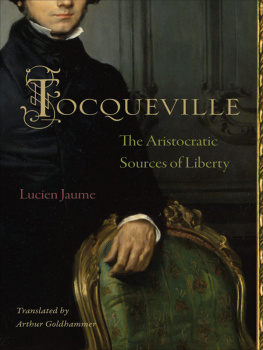

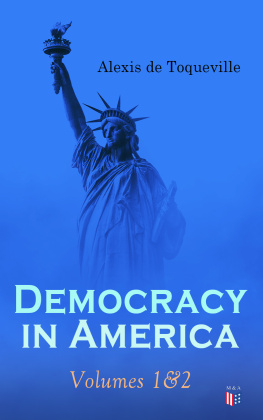
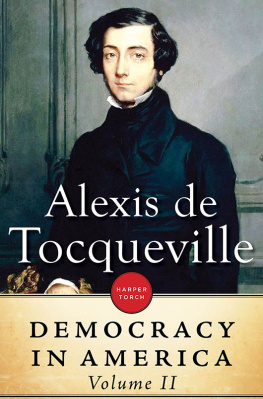
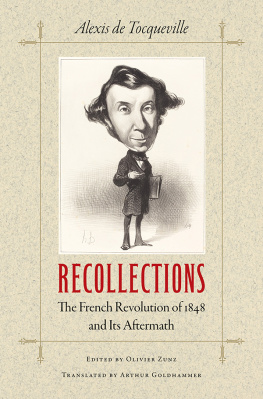

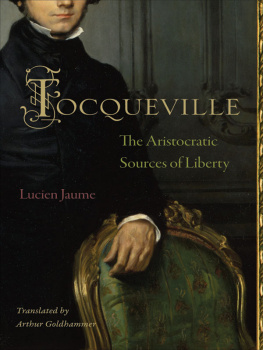
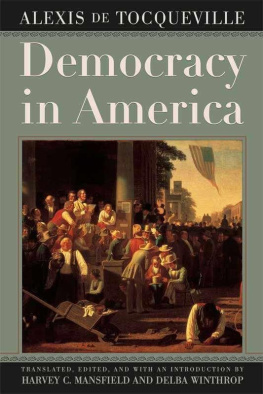
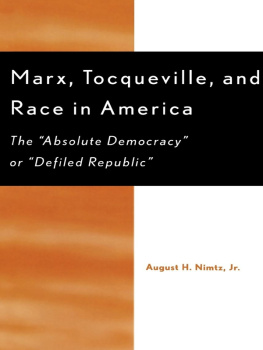


 ocqueville
ocqueville